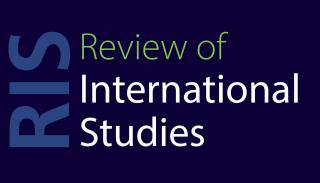
Breadcrumbs navigation
Call for special issue proposals - Review of International Studies
The Review of International Studies (RIS) invites proposals for a special issue to be published in 2025 (vol. 51, issue TBC). RIS special issues contain 7-8 papers as well as an agenda setting introduction/conclusion. The deadline for the submission of special issue proposals is 5pm BST on Friday 22 March 2024. The selection process is expected to be completed by 30 April 2024.
The special issue will be allocated 100,000 words. The individual articles comprising it should be between 8,000 - 12,000 words in length. Special issues are also expected to include an introduction, which may be shorter than main article length. It is not necessary for a special issue to have both an introduction and a conclusion.
Special issues should make an original contribution to cutting edge research. Proposals can relate to any area of the discipline, theoretical orientation, or methodology. Interdisciplinary scholarship is welcome. We encourage contributions that break new theoretical ground and/or combine conceptual innovation with novel empirical findings. Proposals may showcase new debates or lay the groundwork for emerging research domains. We strongly encourage proposals that include contributors from different career stages and from underrepresented backgrounds.
The editors will not consider proposals focused on the discussion of monographs (i.e. book forums) or the career contribution of individual scholars as part of this call.
If you have any questions, please contact the journal by email: RISeditors@bisa.ac.uk
Submission guidelines
Please read these guidelines carefully. Proposals that do not follow these guidelines will not be considered.
1. Proposals should contain only the following information:
a. Title
b. Name, affiliation and email of the proposed guest editor(s);
c. Name, affiliation and email of contributors;
d. Background and rationale for the proposal (max 1000 words) including the expected length of each contribution;
e. Detailed abstracts of all papers (max 300 words per contribution);
f. A description of the state of preparation of each paper (e.g., ‘full conference paper draft presented at X conference’; ‘rough draft ready to be submitted to editors in x months’).
2. In order to ensure timely publication of special issues, guest editors should ensure that 50% of the proposed articles are ready to submit. Accepted proposals will be required to demonstrate evidence that the whole issue can be submitted for review within three months. This evidence will normally be drafts of 50% of the special issue articles. Please bear this in mind when submitting proposals. If your proposal cannot be submitted in its entirety within three months of acceptance, we suggest waiting for a future call.
3. Timeline
After acceptance of proposal
- Within three months – submission of all articles. If this is not achieved RIS will consider selecting an alternate proposal.
- Within five months – reviews received; first decisions made.
After first decision
- Two months for revisions (bear in mind that Revise and Resubmit is commonly recommended by reviewers)
- Two months for further review and decision
- One month for final revisions
- One month for final decision
- Two months for proofing and production.
4. The successful proposal will be selected by members of the editorial team and, if required, in consultation with members of the editorial board. The editorial team’s decision is final. Due to anticipated volume of proposals we are only able to offer minimal feedback on unsuccessful proposals.
5. The Guest Editors will be responsible for ensuring the submission of contributions by an agreed deadline, selection of referees (in consultation with the editorial team) as well as advising on and communicating decisions made after the review process is complete.
6. Please note acceptance of a special issue proposal does not guarantee publication of individual contributions. Contributions will be treated as individual submissions and will be evaluated according to the journal’s established peer review process. It is normal for articles to receive Revise and Resubmit decisions after review and contributors should be prepared to engage with the process of revision in a timely manner.